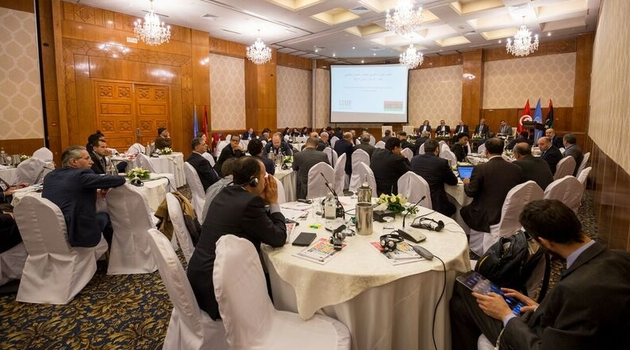The Libya Experts Forum discusses proposal for a national framework on social protection
The fifth meeting of the Libya Experts Development Cooperation Forum has concluded, bringing together Libyan academics, policy makers, prominent experts, entrepreneurs from across Libya, including members of the House of Representatives (HoR) and the international community.
The meeting – which was opened by Ms. Maria do Valle Ribeiro (United Nations Deputy SRSG, Resident and Humanitarian Coordinator for Libya) together with Dr. Mostapha Attir (President of the Forum’s General Assembly) – was largely focused on studying policy options for a national strategic programme on social protection.
Since its institutionalization in September 2016, the Forum acts as an independent, nationally owned neutral platform, for constructive dialogue and proactive discussion with institutions in Libya. The Forum, as an advisory body, is able to translate the findings of fundamental research into policy options and to enable politicians to see the effects of their decisions. During the opening session of the fifth edition of the Forum Mostafa Attir, on behalf of the members, proudly announced the opening of two offices in Benghazi and Sabha in addition to the Tripoli office.
In these two days, the members of the Forum discussed the development of a national framework for social protection that should address poverty and reduce vulnerability in the country, providing immediate support to the poor and vulnerable. Experts from UNICEF and the World Bank contributed to the discussion providing methodological advice and technical expertise. International experiences were also brought to the table to derive lessons learned, in particular an interesting case study on neighboring Tunisia.
Throughout the seven sessions participants discussed the social costs of a possible restructuring of the Libyan economy and consequent mitigating measures through a national programme for post-conflict and fragile contexts. International experiences on fuel subsidies reforms were brought to the attention of the audience to assess their applicability in Libya.
Dr. Taher Jehaimi, a highly committed member of the Forum, highlighted: “In post-conflict Libya, the Libyan authorities face highly complex development challenges. For this reason, the Forum tried to identify the building blocks of a proposed national social protection strategy and the suggested steps for such an initiative to be taken forward. The social protection framework must look at poverty from a multi-dimensional perspective”.
"All the papers presented are aimed at presenting the vision and strategy of building professional state institutions, and this forum is distinguished by the presence of all specialists from Libyan and international institutions," said Mr. Yousef Kamoud, a member of the House of Representatives.
“The Forum will give its contribution towards an integrated and coordinated social protection policy, as we believe this would contribute to social stability and inclusion in Libya, while addressing the root causes of inequality” Mr. Mustafa Attir said.
As way forward, the Forum prepared its medium-term plan and programme of action for 2017-2019 in consultation with international partners and donors. The priority areas for intervention included in the Forum’s programme are security (fighting crime and irregular migration), economic restructuring, social reconciliation, institutional building (including decentralization and local governance, social welfare and legislation).
The fifth edition of the Libyan Experts Development Forum is organized by the United Nations in Libya, UNDP and the World Bank, with the support of Switzerland.
(Source: UNSMIL)





